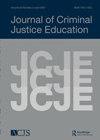“没有我们就没有我们”:分析生活经验对刑罚教育学的潜在贡献
IF 0.9
Q3 CRIMINOLOGY & PENOLOGY
引用次数: 0
摘要
摘要本文探讨了将生活经验犯罪学(LEC)纳入刑罚教育学的必要性和思考。它批判性地分析了CJS生活经验的未充分利用但具有变革性的潜力,以丰富学术课程并进一步告知学生的理解,特别是在澳大利亚。本文借鉴了监狱内外交流项目、共同学习项目和从墙到桥项目等倡议,重点介绍了这些项目如何运用LEC的维度——特别是持续体验叙事(PEN)和共同体验叙事(CEN)——来构建犯罪学知识。然而,考虑到有CJS生活经验的人可能被物化,需要谨慎和道德地扩展这些项目。本文主张在犯罪学课程中更多地纳入生活经验观点,强调它们可以为未来从业者的准备、稳健研究的设计和刑罚认识论的进步带来的价值。此外,它还强调了LEC中背景、地方和专业化的重要性,以及这些教学方法固有的伦理考虑。论文最后呼吁学术界更坚定地致力于包容和赋予有CJS生活经历的个人权力,以呼应残疾人权利运动中的格言“没有我们,什么都不是我们”。本文认为,只有通过这些人有意义和持续的参与,才能实现CJS和学术学科的重大进步。作者感谢Tarmi A’vard夫人(Bendigo TAFE)和Matt Maycock博士(莫纳什大学)阅读了本文的初稿,并提供了宝贵的见解。作者也感谢Aaron Hart博士(Vacro/University of Melbourne)与我的对话,启发了本文的作者。披露声明作者未报告潜在的利益冲突。附加信息关于投稿人的说明奥德韦恩·安托加多是一名研究人员和学者,对澳大利亚的刑事司法系统有亲身经历。他利用自己的亲身经历影响他在学术界、政府和非营利部门的研究和倡导工作。他领导并参与了多个项目,包括澳大利亚社区支持组织、耶稣会社会服务、Vacro和RMIT大学的社区和监狱智库等组织的实践、结构和流程中嵌入和扩大生活经验的观点。Dwayne目前是莫纳什大学社会科学学院的一名学者。他也是《纸链杂志》(Paper Chained Magazine)的资深撰稿人。《纸链杂志》是一家总部位于澳大利亚的杂志,主要讲述受监禁影响的个人的写作和艺术表达。他的研究兴趣包括LGBTQI+在司法系统中的经历、生活经验犯罪学、监狱教育和监狱广播。本文章由计算机程序翻译,如有差异,请以英文原文为准。
“Nothing about Us Without Us”: Analyzing the Potential Contributions of Lived Experience to Penological Pedagogy
AbstractThis paper explores the necessity and considerations of integrating Lived Experience Criminology (LEC) into penological pedagogy. It critically analyses the underutilized, yet transformative, potential of lived experiences of the CJS to enrich academic curricula and further inform student understanding, particularly in Australia. Drawing on initiatives such as the Inside-Out Prison Exchange Program, Learning Together, and Walls to Bridges, the paper highlights how such programs operationalize LEC’s dimensions—particularly Persistent Experiential Narratives (PEN) and Common Experiential Narratives (CEN)—to build criminological knowledge. However, the need for cautious and ethical expansion of these programs is emphasized, considering potential objectification of people with lived experience of the CJS. The paper advocates for greater inclusion of lived experience perspectives in criminology curricula, underscoring the value they could bring to the preparation of future practitioners, the design of robust research, and the advancement of penological epistemology. Additionally, it stresses the importance of context, locality, and specialization within LEC, and the ethical considerations inherent to these pedagogical approaches. The paper concludes by calling for a stronger commitment from academia towards inclusion and empowerment of individuals with lived experience of the CJS, echoing the maxim “Nothing About Us Without Us” from the disability rights movement. The paper posits that significant strides in the CJS and academic discipline are achievable only through meaningful and sustained involvement of these individuals.Keywords: Lived experience criminologypenological pedagogycriminological curriculumpersistent experiential narrativecommon experiential narrative AcknowledgementsThe author thank Mrs. Tarmi A’Vard (Bendigo TAFE) and Dr Matt Maycock (Monash University) for reading early drafts of this paper and providing valuable insights. The author thank also Dr Aaron Hart (Vacro/University of Melbourne) for indulging me in dialogue, inspiring the authorship of this paper.Disclosure statementNo potential conflict of interest was reported by the author(s).Additional informationNotes on contributorsDwayne AntojadoDwayne Antojado is a researcher and academic with lived experience of the criminal justice system in Australia. He uses his lived experience to influence his research and advocacy work in academia, government, and the not-for-profit sector. He has led and worked on various projects embedding and amplifying lived experience perspectives in organizational practice, structure and processes with organizations including, the Australian Community Support Organization, Jesuit Social Services, Vacro, and RMIT University’s community-based and prison-based think tanks. Dwayne is currently an academic in the School of Social Sciences, Monash University. He is also a senior writer for Paper Chained Magazine, an Australian-basedjournal of writing and artistic expression from individuals affected by incarceration. His research interests include LGBTQI+ experiences in the justice system, lived experience criminology, education in prisons, and prison radio.
求助全文
通过发布文献求助,成功后即可免费获取论文全文。
去求助
来源期刊

JOURNAL OF CRIMINAL JUSTICE EDUCATION
CRIMINOLOGY & PENOLOGY-
CiteScore
1.90
自引率
36.40%
发文量
52
期刊介绍:
The Journal of Criminal Justice Education (JCJE) is an official publication of the Academy of Criminal Justice Sciences (ACJS). JCJE provides a forum for the examination, discussion and debate of a broad range of issues concerning post-secondary education in criminal justice, criminology and related areas. The aim of JCJE is to enhance the quality of higher education in criminal justice and criminology. JCJE is an education-oriented journal for those undertaking educational and academic endeavors in the fields of criminal justice and criminology. Quality articles that address specific educational or academic issues in these areas are encouraged and will be considered for publication.
 求助内容:
求助内容: 应助结果提醒方式:
应助结果提醒方式:


